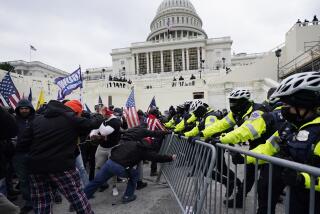Supreme Court upholds bank robbery law from John Dillinger era
- Share via
Reporting from Washington — The Supreme Court warned would-be bank robbers Tuesday that taking a hostage will send them to prison for an extra 10 years or more, even if they merely move a few feet across a room.
In a 9-0 decision, the justices upheld a 1934 law passed in response to bank robber John Dillinger that made it a separate crime with a stiff penalty for a fleeing bandit to “force any person to accompany him.”
Dillinger was known for fleeing with hostages. But Tuesday’s ruling did not involve a cold and professional bank robber.
Rather, the justices upheld a long prison term for a flustered 20-year-old who tried and failed to rob a North Carolina credit union and then hid in a nearby home with an unlocked door.
Larry Whitfield, the would-be robber, called a friend to pick him up, but minutes later, a 79-year old woman with a heart condition who lived there came upon the robber and was badly frightened.
“Ma’am, just calm down. I’m probably more scared than you are, and I’m just trying to leave,” he said, as she moved with him from the hallway to the next room, according to court records. Whitfield had a gun earlier, but threw it away before reaching the house.
When someone knocked on the door, the robber fled to the woods where he was soon captured. But Mary Parnell, the elderly woman, was having difficulty breathing. When police arrived, she was dead of a heart attack.
A jury convicted Whitfield of attempted bank robbery while armed, and separately, of taking a hostage to “accompany him” as he fled. He was acquitted of causing Mary Parnell’s death.
He was sentenced to more than 27 years in prison, and the longer part of sentence was because of his conviction for hostage taking.
In their appeal to the Supreme Court, lawyers for Whitfield argued the federal hostage-taking law should apply only when the robber forces “a victim to travel with him for a substantial distance” when fleeing the bank.
Disagreeing, Justice Antonin Scalia said the phrase “accompany him” can mean moving only a few feet in one room.
Scalia has been the court’s leader in arguing that the laws should be read literally, and not necessarily according to how their congressional sponsors envisioned their meaning.
“The Congress that wrote this provision may well have had most prominently in mind John Dillinger’s driving off with hostages, but it enacted a provision that goes well beyond that,” he wrote in Whitfield vs. United States. “We hold that a bank robber ‘forces a person to accompany him’ when he forces that person to go somewhere with him, even if the movement occurs entirely within a single building or over a short distance.”
Twitter: @DavidGSavage
More to Read
Sign up for Essential California
The most important California stories and recommendations in your inbox every morning.
You may occasionally receive promotional content from the Los Angeles Times.














